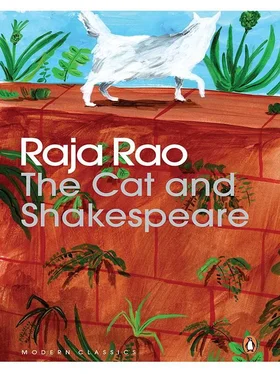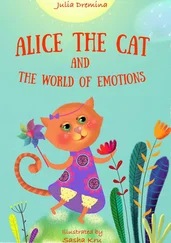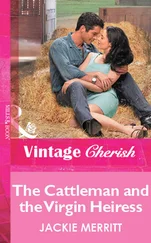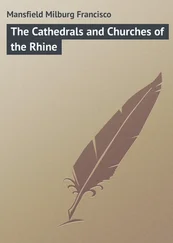Rao Raja - The Cat and Shakespeare
Здесь есть возможность читать онлайн «Rao Raja - The Cat and Shakespeare» весь текст электронной книги совершенно бесплатно (целиком полную версию без сокращений). В некоторых случаях можно слушать аудио, скачать через торрент в формате fb2 и присутствует краткое содержание. Год выпуска: 2014, Издательство: Penguin, Жанр: Современная проза, на английском языке. Описание произведения, (предисловие) а так же отзывы посетителей доступны на портале библиотеки ЛибКат.
- Название:The Cat and Shakespeare
- Автор:
- Издательство:Penguin
- Жанр:
- Год:2014
- ISBN:нет данных
- Рейтинг книги:4 / 5. Голосов: 1
-
Избранное:Добавить в избранное
- Отзывы:
-
Ваша оценка:
- 80
- 1
- 2
- 3
- 4
- 5
The Cat and Shakespeare: краткое содержание, описание и аннотация
Предлагаем к чтению аннотацию, описание, краткое содержание или предисловие (зависит от того, что написал сам автор книги «The Cat and Shakespeare»). Если вы не нашли необходимую информацию о книге — напишите в комментариях, мы постараемся отыскать её.
The Cat and Shakespeare — читать онлайн бесплатно полную книгу (весь текст) целиком
Ниже представлен текст книги, разбитый по страницам. Система сохранения места последней прочитанной страницы, позволяет с удобством читать онлайн бесплатно книгу «The Cat and Shakespeare», без необходимости каждый раз заново искать на чём Вы остановились. Поставьте закладку, и сможете в любой момент перейти на страницу, на которой закончили чтение.
Интервал:
Закладка:
The English language does not have sufficiently deep roots in India. It is therefore important for the writer to find his own individual style through which to express his world view. The reader, on his part, if he is not to misread the text, must get to know the writer’s epistemological viewpoint, or the sum total of beliefs, preconceptions and values which the writer shares with others within a sociocultural context.
R. Parathasarathy
Saratoga Springs, New York
15 January 2014
1
I have a small white house here, with a courtyard. From the back I look over coconut trees, and huts, and somewhere there’s the sound of the sea.
I was appointed divisional clerk, Trivandrum, some two years ago. I left my wife and two children at Pattanur. My eldest was five years of age, my youngest three. It’s not so easy to change schools, you know; and then it was monsoon time. When I thought of the bad new road (which leads to Kamla Bhavan, the noble name my fat landlord inflicted on this blue and ochre-banded building), I suffered to think of Usha coming back from school in this mess. Usha has sensitive hands, and her schoolmistress Tangamma was always telling her: Child, you have the fingers to make a nice braid. You will be a dutiful wife. My wife Saroja said: ‘Nice thing for teachers to be talking of wives already.’ But that is the way with my wife. She cannot help all the time talking of the wife. I am a quiet man, and to speak the truth, I don’t yet know what it is to mean husband.
Yes, at last I had a house. It was new and it was white. It had ochre bands on it — almost as on a temple — and I could hear the sea.
Now that the monsoon was as its fiercest, there was a problem even about going to the office. I ate every day at the Home Friends; the food was bad, but the freedom was so good. When I did not eat at the Home Friends, I could always go to the Trivandrum Brahmins’ Hotel. There the food smells less bad but the place looks more untidy. Life is always this choice — to choose an old house nearer the office or the new one sitting amidst coconut gardens. My wife saw this and said: ‘Oh, it’s just like home, coconut trees, huts, and the sound of the sea.’ For she is from Alwaye. And she never tired of saying how her old grandfather spoke of the way the Dutch landed some two hundred years ago, and thank heavens the Kartikuras’ house was two miles inland — but you could hear the sea — and the Dutch took away all the able-bodied men to fight (or to become Christians), and Kartikura House, being two miles inland, was left in peace. So the two miles and the coconut trees saved the Kartikura people, and thus emerged my wife, and from her and me, Usha and Vithal, my last born, a boy so round and fresh, with a tilak on his brow, and he leaps when he sees a car, and says, ‘Take me on a pom-pom,’ but I make him ride on my knee. But here, in Trivandrum, I sit alone and ride my own knee, as it were. I like being alone. I like eating dose and drinking coffee at Jyothibhavan. ‘Hey, take this away, this is such bad coffee,’ you can always say to the Brahmin boy, but you cannot say that to Saroja. She will talk of the Dutch and Christianity — and the sea.
The Dutch of course are an able-bodied people who have white ships. I have seen them because I have been to Bombay. During the war I tried to get into the navy and have better emoluments. At the interview they made me sit and leap so much, I cried, ‘Ay ya yo yo,’ and said: ‘No more silver than this hand can earn driving a nib.’ A man is meant to work for his wife, to feed her, and for the children to go to school (I so much liked Usha coming back along the railway embankment from school — three miles are three good miles from Pattanur to Alwaye, but then there’s the signal, the red and green lights, and all the other children, and father at home. Vithal was, of course, always in his mother’s arms).
I was thirty-three, and I had ever wondered that one is alive. I wanted to become a rich man, for then my wife would be so happy that I could do what I liked. If my plans went well — and in the new India plans are never so difficult, the new is made with plans — I would build a big house, like contractor Srinivasa Pai. He is some distant cousin of mine, and I no more like his house than I like his face. But people usually introduce me in the office saying, ‘This is Mr Ramakrishna Pai, cousin of Srinivasa Pai of Chalai Bazaar,’ as if I belonged to some royal lineage. My lineage smells of chilli and cardamom and tamarind as my wife’s does of coconuts. But then my wife’s people had two or three boats that plied the canals, and banditry and pilfering can make a lot of difference with prices. One can build a Kartikura House on thuggery. My wife was the second child; the first daughter was amply given away to a merchant in Ernakulam. Sundari (my wife’s sister) must tell Ramu, her husband, about the Dutch and the sea. Ernakulam must have many ruins and the Dutch must have left a few guns there. In Kartikura House they still show you Dutch cannon balls. When you plough for the tapioca sowings, the cannon balls come out just like the tapioca. Usha used to say, ‘The cannon is hard tapioca but this tapioca is man’s.’ Thus the cannon became the gods’. Strange how we transform all things into ours. Our houses must look like us, just as our ancestors built temples in the shape of man. In Chidamabaram Temple, Shankar Iyer says, the image of Shiva occupies the place of the heart. Then what is the place Parwathi 1occupies? I sometimes wonder whether I have a heart as I wonder in summer whether the rains will ever come. In heat I strike. I struck my wife only twice and have left marks on her face.
I don’t know if you’ve heard of a bilva tree — it has three leaves and a crust of thick thorns. It’s a scraggy tree but dear to Shiva, for one night a hunter trying to shoot at his game — was it a deer or a porcupine? — went up this obnoxious stump, and in his hours of waiting, sent down leaf after leaf, so they say, and a Shiva image being beneath, Shiva himself came in a vision and said: ‘Here I am.’ For it’s not the way you worship that is important but what you adore. Even an accidental fall of leaves on Shiva’s head got the wicked hunter his vision. And thus the stump of tree became sacred — and its trefoil sacred, for all that is sacred to God.
So when I look from my window eastwards, just by the garden wall, I see this stump of bilva tree, thorns visible in the morning sun. And I wonder if God will ever bless me, just like that.
Vithal would have to go to school next year, I was saying to myself one vacant morning. Usha would have to be brought to Trivandrum and sent to the convent. The sisters there, you know, are Belgian, they say, and very good. They teach excellent English — and never forget they also teach Malayalam. But then for a Saraswath Brahmin 2like me, Malayalam or English is all the same. The Revenue Board has no preference, or if preferences there be, they lie in the direction of English. But soon it will be Hindi, and my Konkani will be of help. God helps one in everything. Will I build a big house? That is what I asked looking at the tree.
Just at that moment Govindan Nair looks up from between the leaves and says: ‘Hey there, be you at home?’ That is his style, if one may say so, of talking. It’s a mixture of The Vicar of Wakefield and Shakespeare. The words are choice, the choice of the situation clumsy. He never says come and go. He will always say: ‘Gentleman, may I invite myself there? Will I be permitted into your presence?’ That’s ever the way with him, in English or in Malayalam. He must twist a thing into its essence and spread it out. So that milk becomes cow’s precious liquid or water the aqua of Ganges. His heart is so big, it builds a wall lest it runs away with everything. He always wants to run away with everything. In fact he himself is. running.
Читать дальшеИнтервал:
Закладка:
Похожие книги на «The Cat and Shakespeare»
Представляем Вашему вниманию похожие книги на «The Cat and Shakespeare» списком для выбора. Мы отобрали схожую по названию и смыслу литературу в надежде предоставить читателям больше вариантов отыскать новые, интересные, ещё непрочитанные произведения.
Обсуждение, отзывы о книге «The Cat and Shakespeare» и просто собственные мнения читателей. Оставьте ваши комментарии, напишите, что Вы думаете о произведении, его смысле или главных героях. Укажите что конкретно понравилось, а что нет, и почему Вы так считаете.












